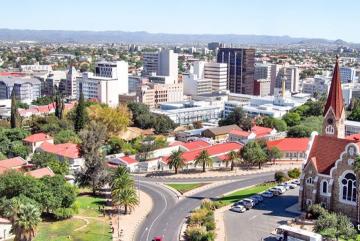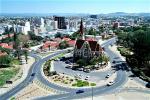Namibia’s economy Shrank in Second Quarter
 Namibia’s economy shrunk by 1.2 percent in the second quarter of 2016. File Photo: Windhoek, the capital of Namibia.
Namibia’s economy shrunk by 1.2 percent in the second quarter of 2016. File Photo: Windhoek, the capital of Namibia.
WINDHOEK – Namibia’s economy shrunk by 1.2 percent in the second quarter of 2016 compared with a revised 3.4 percent expansion in the first three months of the year, data on the statistics agency’s website showed on Tuesday.
Construction, hospitality and mining sectors were the largest contributors to the decline, contracting 19.9 percent, 15.5 percent and 13.2 percent respectively in the quarter.
Fitch Ratings announced early this month that it had downgraded Namibia's economic outlook from stable to negative, as the government debt leaped from 23.2 percent in 2014 and to a forecasted 39 percent of GDP by the end of 2016.
The rating agency also revised the outlook for state firms Telecom Namibia, Namport, NamWater and NamPower from stable to negative.
It also cited falling Southern African Customs Union revenue and the 10-year 750 million Eurobond Namibia got in 2015, and the dwindling foreign reserves.
Namibia's high deficit, the projections of national debt growing above and beyond the accepted threshold, as well as the high likelihood of government not being able to narrow the deficit in the coming financial years, are said to be the main reasons behind the downgrade. Other reasons given are weak economic growth and the likely impact of the recently announced New Equitable Economic Empowerment Framework (NEEEF),which Fitch says, "could slow down foreign investment in manufacturing and services."
The proposed New Equitable Economic Empowerment Framework that would entail that companies give 25 percent shares to previously disadvantaged Namibians
Fitch said although the proposed economic law lacks details, it is likely that parliament will approve it thereby causing “some unease in the business community and could slow down foreign investment in manufacturing and services”.
Eloise du Plessis, an analyst and equity strategist at PSG Namibia said the decision by Fitch, stoked fears that a downgrade may now be imminent.
Finance Minister Calle Schlettwein appealed for calm after Fitch's announcement.
“We need to be careful in handling cases in our economy, such as wage negotiations,” he said, adding that the whole world is facing an economic slowdown, and Namibia being a small open economy, is not spared that.
“We cannot put up with all demands. Some demands are too much, and we cannot run our economy like that,” he said.
Most Popular
SA REITs eager to seize opportunities in other African countries
South African Real Estate Investment Trusts (REITs) have renewed their appetite for African property assets following a challenging economic environment negatively impacted the local listed property sector in 2018. ... Full story











